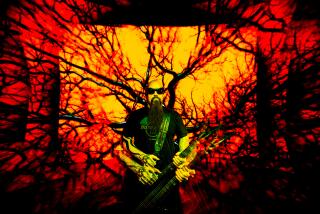Over his scares?
- Share via
Stephen King offers bubble gum to a visitor, who declines.
“But it’s strawberry,” he wheedles.
“Maybe later,” she relents.
“Great,” says King with a whoop. “My mother told me any girl who chews will smoke. If she smokes she’ll drink. If she drinks she’ll do everything bad.”
Most authors don’t start interviews by quoting their mothers and blowing bubbles. But King, the irrepressible horror cult hero, is the planet’s richest, most famous and most prolific scary writer. And he can do just about any darned adolescent thing he wants. Even though he’s 56.
Starting with “Carrie,” written when he was 24 -- through “Christine,” “Cujo,” “Salem’s Lot,” “The Shining,” “Pet Sematary,” “Misery,” “The Shawshank Redemption,” “The Green Mile,” the list goes on and on -- King has written one or two books a year, every year of his life since. By now, almost a billion of his books are in circulation.
And almost every title has been optioned for films or TV. The latest is “Dreamcatcher.”
Last week, Warner Bros. rented the entire 11th floor of a Westwood hotel so King could meet the press to discuss the new film, based on his 2001 book. The studio guys who surrounded King were all shiny in their Hollywood haircuts and precision-cut suits, which made King look even more like the cool, guitar-playing cat he is: rumpled hair, ratty tennis shoes, threadbare jeans and a shirt that hung, scarecrow style, on his 6-foot-3, 180-pound frame. Hey, when you’re Stephen King, whom do you have to impress?
Well, just about everyone, it turns out. Stephen King cares. He comes across as a sweet, sentimental ghoul -- oops, guy. He still wears his original $7.50 wedding band after all these years. (Tabitha King, his wife of 32 years, long ago lost hers.) He does not take his health, his family, his writing ability or his horrific monster-riddled imagination for granted, he says. In fact, he had no idea if he’d ever be able to write again after he was hit by a truck while walking beside a Maine country road in 1999 and almost died of his injuries.
“Dreamcatcher,” King’s first full-length book after the accident, proved that his mind-sucking, bloodcurdling monsters had not deserted him. It also proved he could still stick it to the reviewers, who have never ranked him among the literary elite. They now had to struggle for family-friendly words to describe his nasty new creatures. They are slimy, disease-spreading extraterrestrial weasels that invade one’s intestines and cause all manner of rude bodily functions to erupt. Once they’re inside, you are as good as gone. When they leave, messily, through the posterior, you are definitely dead.
“Good horror stories take you over a taboo line into territory that is off limits,” King explains. But there are so few off-limits places left. “The bedroom used to be taboo. Now, the camera goes right in and watches what goes on.”
King says he decided the bathroom was the one taboo place left.
“It’s virgin territory as far as the camera goes. And some really terrible things in our lives are things we first discover there. It’s where we take off our clothes, look at ourselves in the mirror, perform certain eliminatory functions and where, a lot of times, we get the first inkling that something’s not right with us anymore.”
Turns out reviewers liked the book, which also features earnest, working-class guys who’ve been friends since childhood and who meet the alien weasels while on an annual winter hunting trip in the Maine woods. The film, directed by Lawrence Kasdan with screenplay by William Goldman, has received lukewarm reviews.
Does King like the movie? “If I didn’t, I wouldn’t be sitting here. I’d be back home,” he says. “More important, did you like the movie?” he asks.
It was terrifying. Covered my eyes through much of it.
“Pleased to hear it,” he says.
But why horror tales in a time of real-life horrors? King sits straight up, suddenly on guard. “A horror story gives you a way to examine things that bother you, through a vehicle that is make-believe. People enjoy going into a dream world where they get scared, but when the lights come up, they know everything will be OK.”
Unfortunately, he says, the war with Iraq isn’t imaginary. And though once a war has begun, he thinks everyone should “hang together and get behind it,” he still believes it’s “an ill-advised venture.”
*
What’s next?
King is in obvious pain as he talks. More than four years since the accident, he still can’t find a comfort zone for his aching leg. It was pretty much pulverized, along with his hip, and his spine was chipped in five places, and one lung was collapsed. King puts on a leg brace, then takes it off. He slings the leg over a chair arm, finds no relief and puts it back down. He gets physical therapy four days a week, he says, and hopes to eventually return to the tennis courts and all his other usual activities.
Recent reports that he has decided to retire from writing are not exactly true, he says. “I love to write.... And if I really like something and think it’s really good, I’ll publish it. But I do think I’ve said everything I have to say in terms of stories. You get to a point where you not only start to repeat yourself, but you start to think you’re important ... which means you become boring and sort of a windbag. I have to be very careful of that.”
He has no long-standing contracts or obligations with anybody, he says. “I have a handshake obligation with John Mellencamp to write the book for a Broadway musical. I’ve already done a treatment. It’s based on a true 1940s case of two Indiana brothers in love with the same girl. One brother kills the other. I loved the idea. Other than that, I’m done.”
Done? Well, not yet. He’s working on the last of 13 episodes he wrote for an upcoming ABC TV series, “Kingdom Hospital,” which he will also produce. Then there are the last three novels of the “Dark Tower” series. “I started that when I was 22. People have been asking when I will finish. So I did.” The first of the books to complete the series will be published in November. Two more are written “but need to be polished and go through the editorial process. But if I died today, all three of those books would be published. That story would be done.”
And if, as seems much more likely, he doesn’t die in the next few hours?
“Who can predict what I’ll do? Certainly not me.”
King has paved a smooth way for himself no matter what happens.
“The Bible says to tithe 10%,” he says, “so 10% of everything we make every year goes back into the community. If I make, let’s say, $20 million in a year, $2 million goes back.”
Forbes estimates King’s annual income at closer to $60 million, which is probably why so many Maine libraries, hospitals, scholarship students and schools are so grateful that he continues to live in the state.
The Kings particularly like to fund scholarships, schools and libraries because they were once such impoverished students themselves. King went to the University of Maine on a scholarship, where he first started writing novels and putting them in drawers or in the trash. He met his wife there, and the pair began married life in a trailer, working at menial jobs until King started to teach. When he wrote a novel in his spare time about a lonely, tormented, telekinetic teenage murderess named Carrie, he tossed it in the trash. His wife fished it out, read it and told him it was good enough for publication.
She has since stepped in many times to change his life, he has said in interviews. Years ago, she arranged an intervention because King had become addicted to alcohol and drugs. He has remained clean and sober ever since, he says. If you don’t count the bubblegum.
More to Read
Sign up for our Book Club newsletter
Get the latest news, events and more from the Los Angeles Times Book Club, and help us get L.A. reading and talking.
You may occasionally receive promotional content from the Los Angeles Times.









